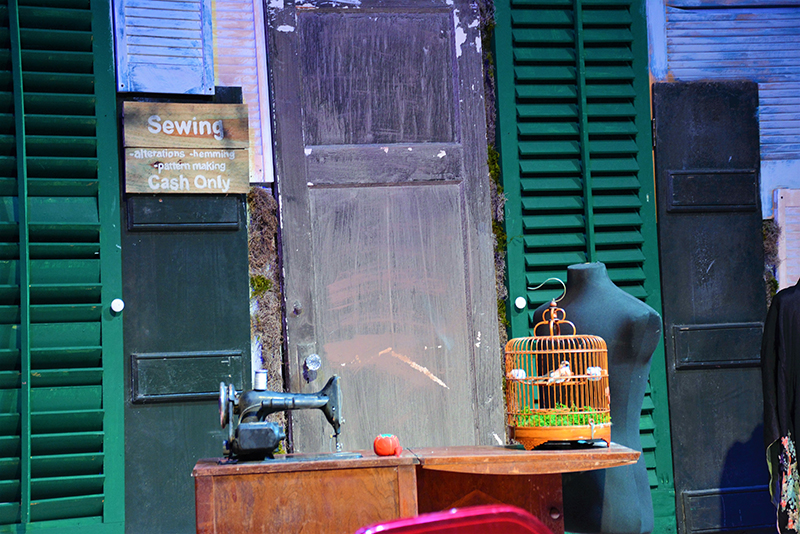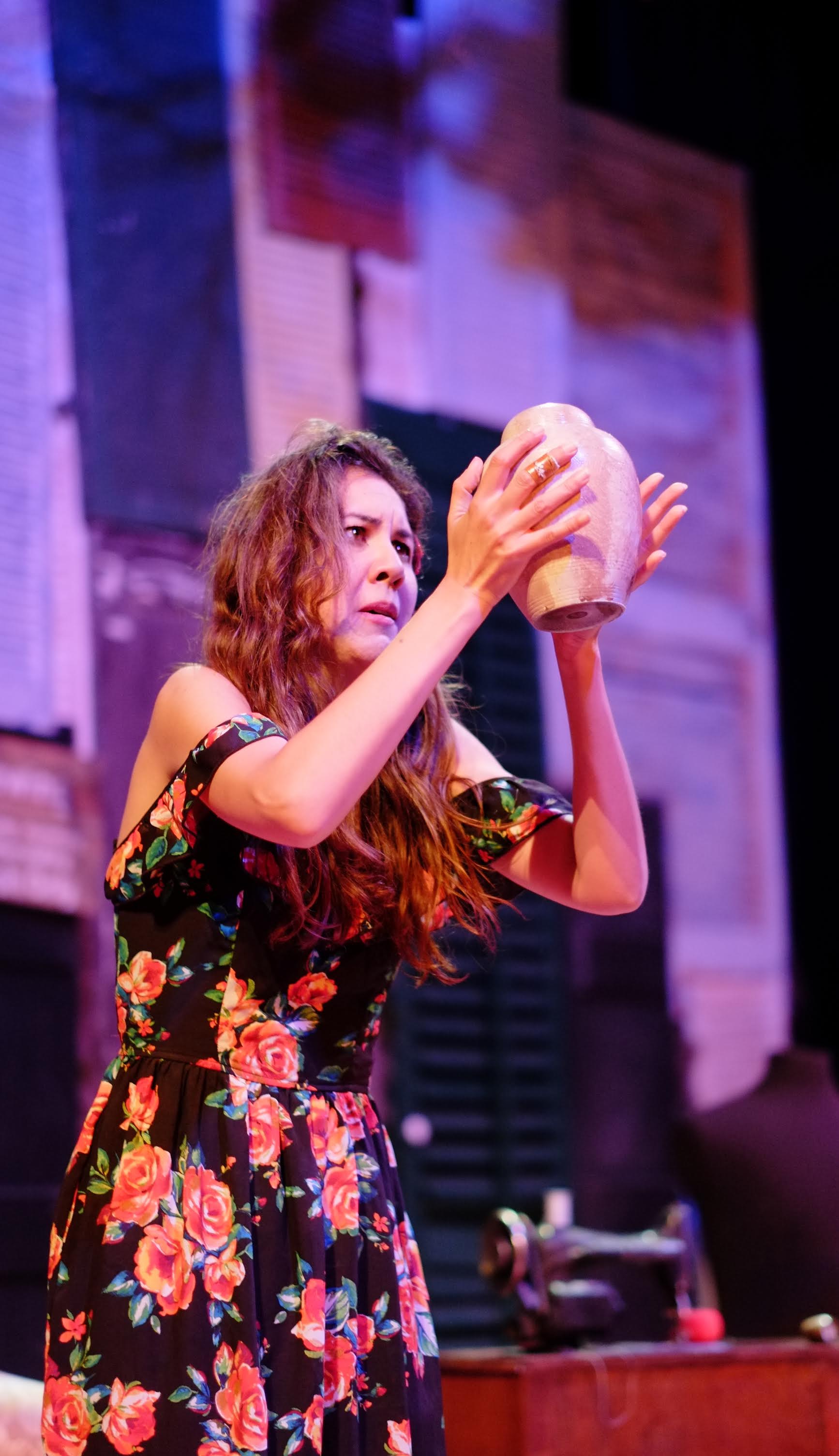The Rose Tattoo, by Tennessee Williams, is the story of a small town of Sicilian immigrants on the Gulf Coast of Mississippi, not far from New Orleans. At the center of the tale is Serafina delle Rose, who makes a decent living working as a seamstress out of her home, which she shares with her beloved husband and daughter.

Serafina is madly in love with her husband, and in her eyes he can do no wrong. She sees him as the perfect Sicilian man, and puts him up on a pedestal taller than Mount Etna. But then he is tragically killed while driving his truck full of bananas (and some other unnamed, yet more controversial—and clearly more valuable—cargo). The loss sends Serafina into a three-year spiral of depression, reclusion and bitter despair. She shuts herself up in her tiny house, cutting herself off from the outside world and all acquaintances apart from her daughter, whom she attempts to drag into her dark, shuttered world along with her. Serafina decides that she will never love again, that no other man will ever be worthy of touching her. She resigns herself to living out her lonely days with only the company of her poor, sheltered daughter, and the constant companionship of her husband’s ashes in an urn (or shrine) in the living room. Along with the occasional visit from a friendly goat.

When Serafina hears the disturbing rumor of her precious husband’s affair with a local woman, she is inconsolable. She stops working, loving, living…even getting dressed every day, and becomes even more of a hermit bitch—mean and terrible to all who come near.
But two things happen to force Serafina out of her bubble of gloom, and they both involve affairs of the heart. The first is her daughter’s graduation and budding romance with a (gasp) sailor, a union which the girl’s mom finds scandalous. The second event occurs when a man suddenly appears on her doorstep. Named Alvaro Mangiacavallo, he is a lonely bachelor who resembles her husband in certain significant ways—not the least of which is having the very same tattoo of a rose across his chest. This man is able to make Serafina laugh again, and just might be the cure for her broken heart.

The Rose Tattoo is well-acted and full of talented performers. Lillian J. Small is a fabulous Serafina, and Linnea Gregg does an excellent job as her daughter, Rosa delle Rose. The actors behind the “party girls”, Flora and Bessie, are funny and endearing in their supporting roles, with the perfect balance of pettiness and promiscuity needed to depict their characters.
The play is very enjoyable, and it’s nothing if not unusual. In fact, it’s rather unique, quirky…even weird. But those are all good things. It keeps things interesting. Take the bizarre neighborhood lady with the wild and crazy, frizzed-out hair. She wanders around without direction or purpose, making trouble and sipping a can of PBR through a straw. You’re not sure what to make of her—malicious busybody or harmless vagabond—but she adds to the storyline all the same.

And then there’s the Black Goat, the strangest creature in the bunch. Brilliantly portrayed by Erin Cessna, her character may not have the most lines to memorize in this production, but it was still not an easy role to bring to life. Queen of the one-liner, the Black Goat interjects her characteristic “Baaaa!” throughout the duration of the show, at both suitable and highly inappropriate times. Going one step further into genuine method acting, Cessna spends a considerable amount of the second act literally ripping up the pages of a magazine and chewing on the paper, in pure goat form. It was captivating and surreal. It felt like some sort of theatrical merging of Waiting for Godot and The Three Billy Goats Gruff.
Indeed, the play crosses lines in the best possible ways. Whether it’s crossing genres (Is this avant garde? Absurdist? Tragedy, or comedy? Probably all of the above…), or crossing emotional boundaries (I found myself confused, deeply touched, sad, inspired, and laughing out loud in various parts), the play covers a lot of ground.
Humor is in ample supply. Even if paper-eating gets your goat, you still can’t help but smile throughout, and especially at the end as you witness the witty banter between Serafina and her new suitor, Alvaro. There’s just the right amount of sex. There’s plenty of action—chases and fights and what really is to be considered as slapstick comedy. And there’s deeper stuff too—love, of course, and family loyalty, friendship, pride, honor…the list goes on.

The audience is seated right on the stage, which gives you an intimacy with the characters. It also means you won’t have to worry about getting good seats at this show, because everyone is guaranteed to be front and center. The downside is that when things get rowdy, you better tuck in your legs and watch out for falling chairs, flying broomsticks, and actors running past you, mere inches away. But that’s a small price to pay for being so close to the action that you’re pulled right into the show, and become further engaged in the story.

I highly recommend The Rose Tattoo. Tennessee Williams had an important connection with New Orleans, and he certainly knew how to spin a good tale, goats and all. The Tennessee Williams Theatre Company of New Orleans does his writing justice with this excellent production. If you’re looking for straightforward, simplistic, mundane theater, this might not be the show for you. But if you don’t mind some twists and turns, some creative license and a whole lot of fun, this play shouldn’t be missed.
The Rose Tattoo, a production by the Tennessee Williams Theatre Company of New Orleans, is playing now through August 7 at the Samuel Dubois Cook Theatre on the campus of Dillard University. Directed by Augustin J. Correro. For more information or to buy tickets, go to www.twtheatrenola.com.
Photos by Ride Hamilton and Kathy Bradshaw.

